Ofcom 2016 Report – Average UK Home Broadband Speeds Reach 28.9Mbps
The telecoms regulator has today published their re-jigged annual 2016 report into the Internet performance of the United Kingdom’s largest fixed line home broadband ISPs and their customers, which reveals that the average home download speed has jumped from 22.8Mbps last year to 28.9Mbps now. But the gap between rural and urban areas is still significant.
In addition, the average upload speed increased to 3.7Mbps (Megabits per second), which is up from 2.9Mbps at the last report in 2015 (here). The data itself was gathered during November 2015 via specially modified routers from SamKnows, which were installed in around 2,000 homes across the UK.
Advertisement
Sadly the limited sample size remains a hindrance and this also means that Ofcom’s results are only useful for reflecting the performance of those who subscribe to the markets largest ISPs, primarily BT, Sky Broadband, EE, PlusNet, TalkTalk and Virgin Media.
Average UK Download Speeds (% Improvement vs Prior Report)
* March 2016 = 28.9Mbps
* February 2015 = 22.8Mbps (+21.93%)
* October 2014 = 18.7Mbps (+5.06%)
* April 2014 = 17.8Mbps (+21.09%)
* August 2013 = 14.7Mbps (+22.50%)
* March 2013 = 12Mbps (+34%)
However Ofcom’s new report has made some panel changes, which are designed to deliver an improved representation of all the major broadband packages and to allow for a better analysis of consumer experiences in urban and rural areas. Part of this has involved a rebalancing of the sample data so as to be “less dominated by high-speed packages“.
On top of that it’s worth remembering that the Government’s Broadband Delivery UK programme, which is predominantly working with BT to roll-out superfast broadband (24Mbps+) connectivity (FTTC/P) to 95% of the UK by 2017/18, has made good progress over the past year. Sadly many rural areas have yet to benefit and so the gap remains very noticeable and future urban upgrades may only widen it.
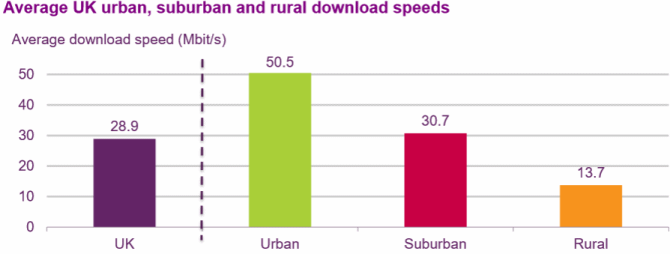
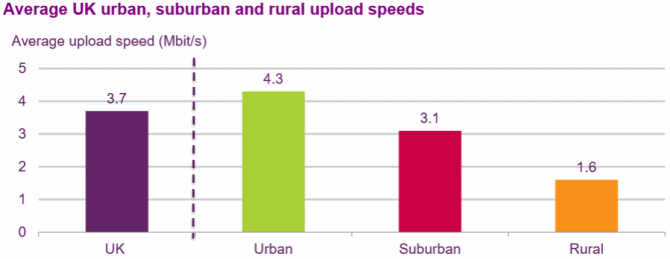
Clearly urban areas continue to exert the most influence on Ofcom’s report, which is also being boosted by Virgin Media’s cable network expansion (here) and their latest 200Mbps speed upgrade (here). BT’s 500Mbps capable G.fast upgrade may also add to this urban boost in the future (here and here), but we don’t expect that to begin a commercial roll-out until next summer.
Advertisement
Otherwise it’s important to remember that the availability of a “superfast” connection method doesn’t strictly mirror take-up and a lot of people are happy to stay on slower copper ADSL2+ (up to 20Mbps) lines for the time being, not least due to the lower cost and or a lack of awareness about the availability of upgrades. All of this impacts the results.
Otherwise it’s no surprise to find that the performance split by connection technology hasn’t changed much since the last report, with Virgin Media’s cable network continuing to do well.

Otherwise most of the reported performance improvement in this report continue to stem from already well upgraded urban areas and their expanding adoption of superfast connectivity, particularly on Virgin Media’s cable network.
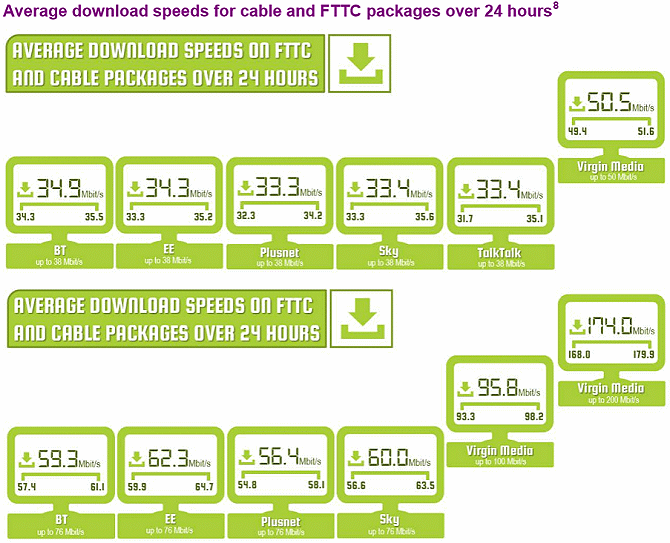
Advertisement
Resolving Speed Complaints
At this point we usually find it helpful to point our readers towards Ofcom’s Voluntary Broadband Speeds Code of Practice (a separate version exists for business users), which broadly requires member ISPs to provide reliable estimates of connection performance and to also help resolve related problems when they arise.
Furthermore the code requires ISPs to give new customers a Minimum Guaranteed Access Line Speed (MGALS), which reflects the access line speeds achieved by the slowest 10% of the provider’s broadband subscribers.
Crucially if the ISP cannot resolve your problem and the performance has fallen below the provider’s MGALS level then the code allows you to leave your contract penalty free and switch to another provider, although this won’t necessarily resolve the underlying problem (especially if it’s related to BTOpenreach’s infrastructure).
Ordinarily we’d do a much more extensive summary, but right now I’m taking an Easter break. Check out the full report here.
Mark is a professional technology writer, IT consultant and computer engineer from Dorset (England), he also founded ISPreview in 1999 and enjoys analysing the latest telecoms and broadband developments. Find me on X (Twitter), Mastodon, Facebook, BlueSky, Threads.net and Linkedin.
« New Micro Fibre Optic Cable to Help BT Openreach’s UK Network Capacity
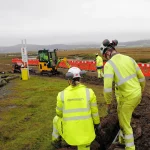


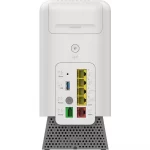


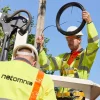









































Comments are closed